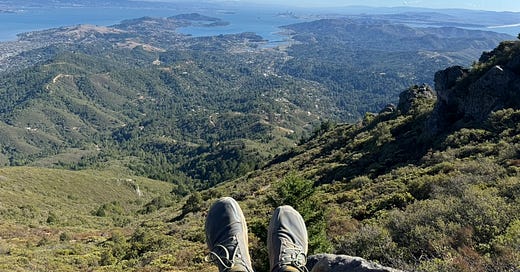How to start a manual transmission on a San Francisco hill without rolling back: one foot on the clutch, the other on the brake. Pull the handbrake but hold the release button, so the lever moves freely. Take your foot off the brake pedal; the handbrake holds the weight of the car. In one motion, drop the handbrake, let the clutch out, and give it some gas. If you’re too early, you stall the engine; too late, you roll backwards and crash. If you get it just right, though, the subtle vibration of the idle engine becomes muted as it bears the load. The pitch increases as you open the throttle, then (shifting into second) drops and rises and (third) drops again, rising more slowly now. The force becomes speed and the noise of the wind begins to compete with the heady thrumming of the machine. The road curves away and—clutch, brake, downshift, effortlessly synchronizing the engine to the transmission, nerves piercing suddenly into the masses of rotating steel, car and driver alike running on gasoline. And fusion releases energy on Earth as it does in heaven. The momentary upwelling of vitality resembles those cataclysmic supernovae that outshine entire galaxies.
*
I started running at the ocean, two thousand feet below. The spring and joy of the first few miles, the dance in the redwood glens, has faltered; the second segment, under the sudden sky, is over; and now in these remaining miles I explore a jagged land of pain. The steady one-hundred-sixty of my heart escapes my body and fills the entire landscape with the tortured throbbing of some underwater nightclub. The punctuation of dull pain by sharp pains has convinced me that the sustained effort of placing feet on the uneven rocks is shredding my ligaments. But the energy still animating my aching frame emanates from some deeper place that knows that life is distinct from self-preservation. I suspect that my body has utter disregard for the consistent exhortations of modern society—health, longevity, caution. I suspect that my body wants to use itself up.
*
I’ve recently gotten addicted to algorithmic puzzles; so far I have solved one hundred and five problems. Around half of these took less than ten minutes, some, thirty or forty minutes, and a few, many hours. There are twenty or so that I attempted but could not solve, although I feel like I have the right idea. There are many that I’ve skimmed and believe that I can solve given time. Then there are problems of such titanic difficulty that I do not know how to begin.
I’ve found that doing these problems has changed my relationship to intelligence. It is no longer an abstract, murky thing. I have not been able to solve some equations; I do not know how to derive the combinatorial formulas that count numbers with certain properties; I cannot figure out what is wrong with my relatively simple algorithm for finding pairwise intersections of line segments (I suspect strange numerical issues).
I read a tweet once: instead of believing in yourself, generate evidence. And that is how I hope to live: with both achievements and limitations bared to the sun, attacking new challenges instead of defending illusions.
*
Humor me for a moment: I believe I have a grasp now on the secret to happiness. Don’t think bad thoughts.
Having spent a lot of time studying biological evolution and artificial life, I have an affection for ecological metaphors. Along which paths does energy flow? What persists and what decays? What are the units of selection? What are the important relationships, and are they mutual or parasitic?
The selection pressure in the mind seems to be created by attention. That which receives attention persists, and that which does not is evicted from the cache, so to speak. So simply watch your thoughts and learn to reroute them whenever they become noticeably unpleasant. Avoid those habits that provoke bad patterns. Starve out the evil.





I’m trying to practice “don’t think bad thoughts”, I have a bad tendency to spiral. How do you practice “don’t think bad thoughts” without falling into avoiding uncomfortable thoughts?